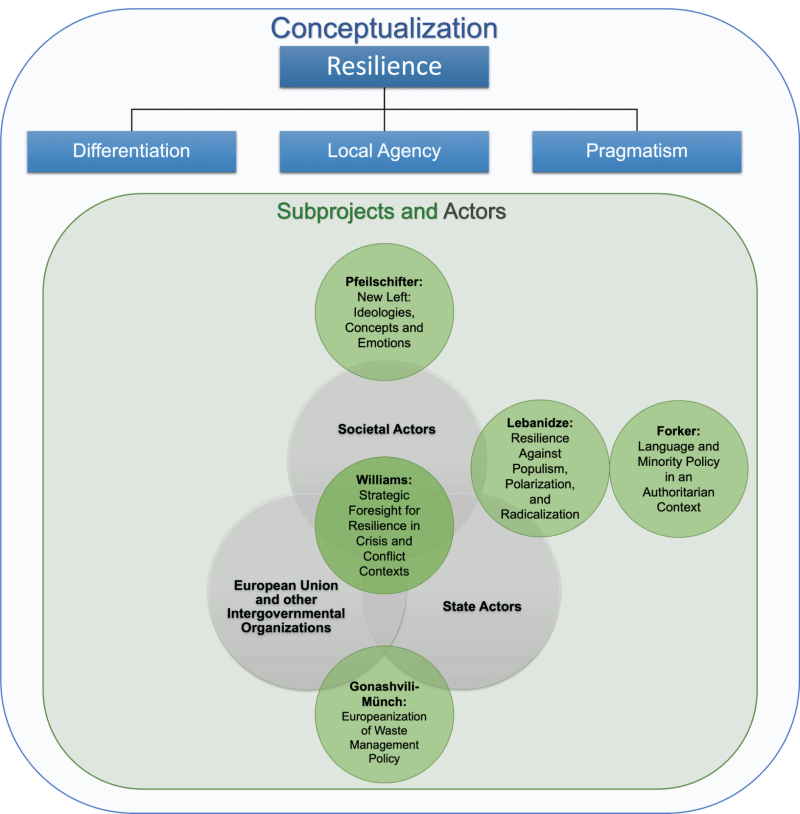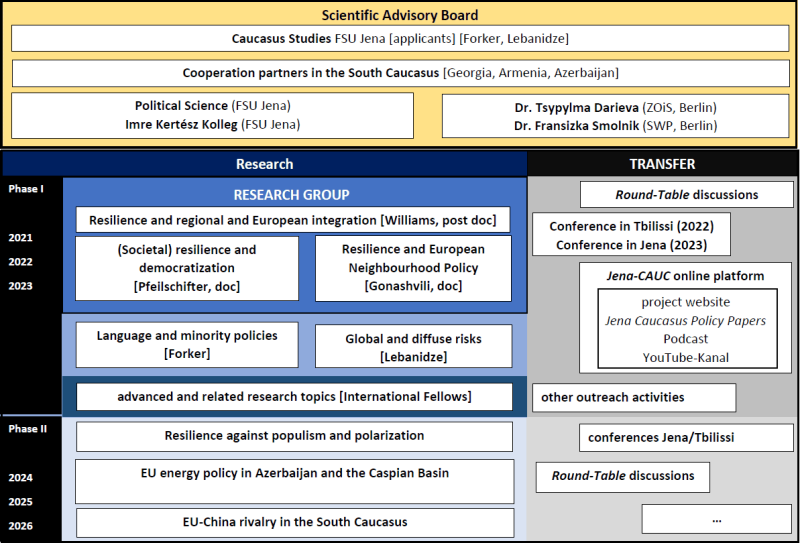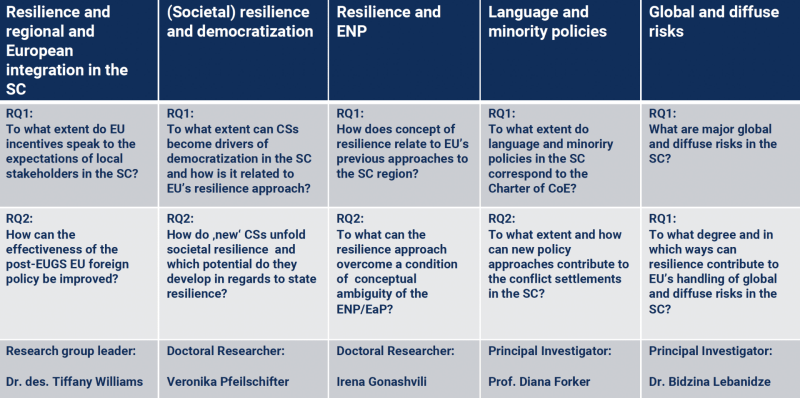About
JENA-CAUC 2.0 – The South Caucasus after the “Zeitenwende”: From regional resilience to local agency (2024-2027)
The second phase of the JENA-CAUC project builds on the research results achieved in the initial phase, and develops further conceptual and empirical focal points, considering recent dramatic events (Russia's war in Ukraine; war over Nagorno-Karabakh). The central theme is still resilience, now expanded to incorporate the concepts of local agency, differentiation, and pragmatism, and to include all three South Caucasian states. The “Zeitenwende,” or turning point, has shown that resilience building on the part of the EU can only be effective if local contexts are better taken into account, and if more pragmatic action is taken at the same time. Therefore, JENA-CAUC 2.0 focuses not only on political actors at the highest levels (e.g., the EU, national governments), but also examines local-level social actors as representatives of diverse social groups, as well as the multifaceted interactions between these actors in different areas, such as security policy, environmental policy, minority policy, and civil society. This project can thus make a significant contribution to research on the relationship between political and social actors in the South Caucasus.
Structure and Participants
JENA-CAUC 2.0 is designed and executed by the same research team that participated in the initial research phase.
The second phase of the project again utilizes the support of a Scientific Advisory Board comprised of members from the FSU Jena, German partner institutes, and cooperation partners in the Caucasus.
Project Objectives and Conceptual Framework
The project aims to analyze the impact of the changing times and the changes in German/European policy towards the states and societies of the South Caucasus using an interdisciplinary research approach. Additionally, a core objective is to, at least partially, fill the identified gaps in the research literature. Various political and social areas will be examined, ranging from political change and reforms to minority policy and security and environmental policies.
While the central theme for JENA-CAUC 2.0 continues to be resilience, the conceptual framework has been expanded to include the concepts of local agency, differentiation, and pragmatism. The evolving sociopolitical shifts that JENA-CAUC 2.0 examines have demonstrated the need to engage more intensively with local conditions. Therefore, along with high-level political actors (e.g., the EU, national governments), the subprojects also focus on local-level social actors and the multifaceted interactions between these groups.
Conceptual Framework of JENA-CAUC 2.0
Illustration: Tiffany G. WilliamsJena-Cauc – Resilience in the South Caucasus: Prospects and challenges of a new EU foreign policy concept (2021-2024)
Objectives
The research project Resilience in the South Caucasus: prospects and challenges of a new EU foreign policy concept (Jena-Cauc) is funded by the German Federal Ministry of Education and Research (BMBF). The project seeks to analyze the impacts of the “resilience turn” of EU foreign policy in the South Caucasus and its contribution to conflict and crisis prevention. Through an inside-out analysis it will focus on studying preferences of state and non-state stakeholders and the role of minority and language policy. Two separate clusters of the project will focus on the relationship between democracy and resilience in the South Caucasus and the place and role of the resilience approach within the wider regional strategy of the EU in the region. In doing so, the project will develop policy-relevant approaches which can contribute to effective implementation of EU’s regional governance in the South Caucasus region. The project combines area studies on the South Caucasus with the analysis of the German-European governance in the region.
Further project goals are the structural strengthening of Caucasus Studies at the FSU Jena through the establishment of national and international cooperation in research and teaching, the communication of results to political and civil society actors, and the increase of the visibility of Caucasus Studies through transfer measures, international conferences, and the establishment of an international fellowship program.
Structure and participants
Participants in the project are (see diagram):
- Research group
- Scientific advisory board (Caucasus Studies FSU Jena, cooperation partners from the FSU Jena, associates and cooperation partners from the Caucasus)
- International fellows.
Each of the participants of the research group as well as international fellows will cover one or more research areas related to the project (resilience and democratization, resilience and European Neighborhood Policy, global and diffuse risks, language and minority policies etc.).
Structure and Participants
Image: Bidzina LebanidzeResearch design and conceptual framework
The research project combines two broad areas of research: (Resilience Turn in) EU Foreign and Security Policy and the South Caucasus Area Studies. The conceptual framework of the project is divided in several policy-relevant sub-topics with individual research questions, research topics, case studies and methodologies. Each of the members of the Research Team as well as principal investigators are responsible to lead the research in individual sub-sections.
Conceptual Framework of JENA-CAUC
Image: Bidzina Lebanidze

